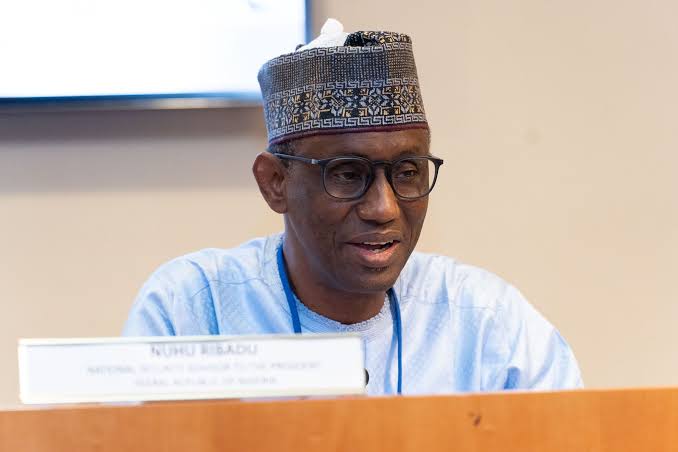Paragraph 1: A Call for Proactive Anti-Corruption Strategies
Mallam Nuhu Ribadu, National Security Adviser to President Bola Tinubu, has advocated for a fundamental shift in Nigeria’s anti-corruption approach. Speaking at the 9th Oba Sikiru Adetona Annual Professorial Lecture, Ribadu argued that the current reactive strategies, focused primarily on arrests and prosecutions, are insufficient to combat the deeply entrenched problem. Instead, he called for a proactive, preventative approach that addresses the systemic and attitudinal roots of corruption. This shift, he emphasized, is crucial to building a system that discourages corrupt practices before they occur, rather than simply reacting to them after the fact. The lecture, titled "Corruption and National Security: Impacts and Consequences," was held at Olabisi Onabanjo University as part of the 91st birthday celebrations of the Awujale and Paramount Ruler of Ijebuland, Oba Sikiru Adetona. Ribadu was represented at the event by the Director General of the Department of State Services, Mr. Oluwatosin Ajayi.
Paragraph 2: The Destructive Impact of Corruption on National Security
Ribadu highlighted the devastating consequences of corruption on Nigeria’s national security. He argued that corruption erodes public trust, compromises the effectiveness of law enforcement agencies, and fosters a culture of impunity. He drew a direct link between corruption and insecurity, citing the diversion of funds meant for military equipment and the undermining of due process in arms procurement as examples of how corruption weakens the nation’s ability to respond to threats. This weakening, he posited, leaves the country vulnerable and undermines its security apparatus. He underscored the urgency of addressing corruption not just as a financial crime but as a critical national security concern.
Paragraph 3: A Collective Responsibility: Beyond Government Officials
Ribadu emphasized that the fight against corruption cannot be limited to government officials alone. He stressed that corruption is endemic within Nigerian society, permeating individual attitudes and behaviors. Therefore, a successful anti-corruption strategy must involve a collective effort from all citizens. He called for a change in mindset, urging individuals to reject corrupt practices and uphold ethical values. He underscored the principle that combating corruption requires both a refusal to offer bribes and a refusal to accept them, emphasizing the shared responsibility of protecting the nation’s commonwealth.
Paragraph 4: Progress in Counter-Insurgency Efforts and Collaborative Security Approach
Beyond the focus on corruption, Ribadu also addressed the nation’s security landscape, highlighting progress made in counter-insurgency operations. He reported significant numbers of Boko Haram combatants surrendering, the neutralization of key commanders, and the successful rehabilitation and reintegration of former insurgents back into society. Ribadu reiterated the Tinubu administration’s commitment to a collaborative security approach, emphasizing partnerships with local governance structures, civil society organizations, traditional institutions, women and youth groups, and the private sector. This multi-faceted approach, he explained, is essential to addressing the complex security challenges facing the nation.
Paragraph 5: Celebrating the Awujale’s Legacy of Leadership and Service
The lecture also served as an occasion to celebrate the remarkable contributions of Oba Sikiru Adetona. Ribadu lauded the monarch as a legendary figure, a courageous voice against corruption, and a staunch advocate for good governance. He praised Oba Adetona’s unwavering commitment to education, his enduring support for the development of Olabisi Onabanjo University, and his selfless service to humanity. Other dignitaries echoed these sentiments, highlighting the Awujale’s profound impact on the university through generous endowments, infrastructural development, and the establishment of the Oba (Dr.) Sikiru Kayode Adetona School for Governance Studies. Speakers described the monarch as a visionary leader, a moral compass, and a symbol of wisdom and integrity.
Paragraph 6: A Call for Integrity and the Awujale’s Continued Influence
The event concluded with a call for Nigerians to embrace truthfulness and integrity as foundational values for national progress. Princess Adetoun Adetona-Daramola, representing the Awujale, urged citizens to prioritize these values as essential for national development. The presence of numerous dignitaries, including traditional rulers, academics, and government officials, underscored the significance of the event and the enduring respect for Oba Adetona’s leadership. The lecture served not only as a platform to discuss critical national issues but also as a testament to the Awujale’s continuing influence and his unwavering commitment to the betterment of Nigeria.














